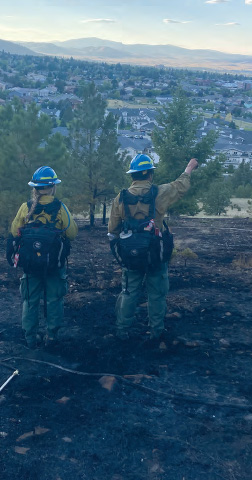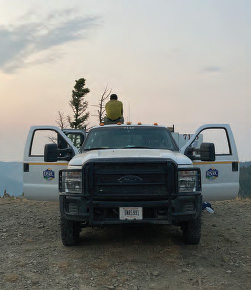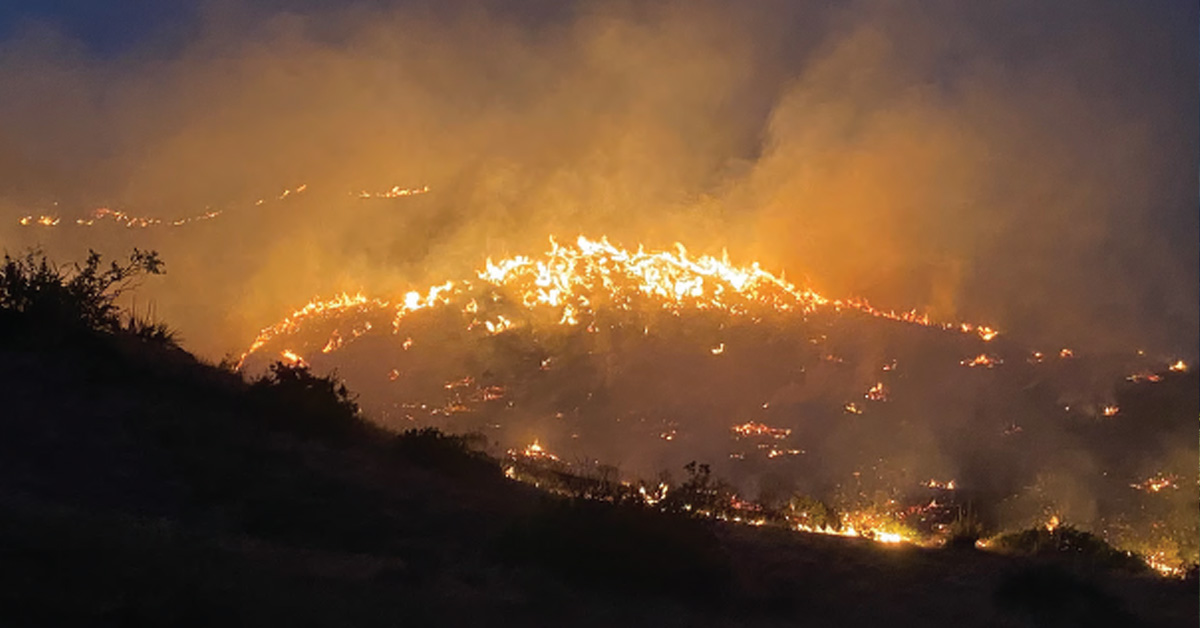Experiences of a Wildland Firefighter
On a Western Fireline
By Eric Kingsley
This past summer, my son Jack Kingsley headed out to Montana to be a wildland firefighter. Working for the Montana Department of Natural Resources & Conservation, he was based out of the state capital Helena. After graduating high school and spending part of the year in the Rockies, firefighting presented him an opportunity to experience the West as few have. While this isn’t either northern or logging, his experience presents a unique look into how so many people outside of the forest industry become aware of forests. Here’s our conversation:
Eric: So, why did you do it? Why head out to Montana, where you knew literally nobody, and fight fires?
Jack Kingsley: I’ve always wanted to be a firefighter. I grew up around it, it goes back now four generations, including me. My great grandfather fought fire [the Great Fires across Maine in the summer of 1947], my grandfather was a chief, my uncle is in the Portland, Maine Fire Department as an officer. I saw the Rockies for the first time this year – while out west as part of a gap year after graduating high school – and thought it would be an amazing way to get to know the country, the land, the people. The forests out there are pretty different than what I grew up around in Maine and New Hampshire, so that made it pretty interesting.
Eric: I’m sure every day is different, but what does a typical day look like for a wildland firefighter?
Jack Kingsley: It starts at 8:30 every morning – late by forestry standards – with a briefing. The whole crew gathers to hear about the fire situation nationally (so we have an idea of what resources are available, and what aren’t), the local weather forecast, any local fires we need to be aware of, Six Minutes for Safety (basically a safety case study), and the availability of aircraft support. Basically, everything a wildland fire crew needs to be operational for the day.

Then it’s an engine check – my crew had engines – basically pickup trucks outfitted for firefighting. We check the vehicle, our radios, our personal gear, and tested the pumps to make sure everything was operational. If something needed attention, this was the time to get it done.
Commencing of mop up stage at a urban wildland interface incident. Opposite page: Firefighter posted as a lookout on the sunset fire.Late morning was physical training (PT). You have to be in shape to be a wildland firefighter – lugging chainsaws up a mountain at elevation is exhausting. We would run, hit the weights, we had an outdoor yard with a bunch of equipment – basically spent a couple hours working out every day. After lunch, that’s when things started to pop. It is the hottest part of the day, the relative humidity does down, and thunderstorms (with lighting) roll in. It is this time of day when we have fires getting called in that we would need to respond to, and even if one wasn’t called in, we would sometimes send an engine out patrolling in an area where we knew lighting was coming, so that we had assets close for when a fire started.
After that – if you’re not on a fire overnight – it is all about cleaning your gear, sharpening your saw, and getting ready to do it again tomorrow. If I wasn’t on a fire, the workday usually ended between 6:00 and 8:00 PM.
Eric: Tell me about your crew, and the type of wildland firefighting you did.
Jack Kingsley: I was part of an Initial Attack crew – that describes the posture of the unit. Basically, our job was to find and fight fires when they’re small and easy to contain. We had six engines and a helicopter in my unit, and our unit was often spread out on multiple incidents at the same time.
We were in a race with fire – be the first on the scene, hit them hard and fast with everything we have, and call in additional resources when we need them. You hear about the huge fires on the news – those are the ones that weren’t contained in the initial 24 to 48 hours. My job – our job – was to do everything we could to not have our fires big enough to be on the news. Something like 90% of all wildland fires are contained in the initial operation period of 24 to 48 hours, and nobody ever hears about them. For my crew, that was success.
Eric: Do you have a favorite memory?
Jack Kingsley: Yeah – backburning is one of the coolest things you can do in life. That’s when you use a drip torch and set fire to an area in order to reduce fuel load. We would use it to contain active fires and keep them from “running” on us – basically getting out of control. It the crew deciding where to fight the fire, instead of letting the fire dictate the situation. It is amazing to set all these acres on fire and watch the positive destruction – and have fire on your team, for once.
Eric: And your least favorite?
Jack Kingsley: Waiting. It seemed like all we did some days. It is incredibly boring to sit around waiting for a fire, but that’s the job. You can only work out so much, so there’s a lot of time just hanging around waiting for lighting to strike – literally. Of course, when it does things go from boring to exciting pretty quickly.
Eric: Training is important for any job. How much formal training did you get, and how much was on-the-job?

Jack Kingsley: We called it being rookied in. You show up and you’re going get a lot of information in a short amount of time, kind of like drinking from a fire hose. I got what was called basic critical training, just everything from how winds work on mountains, topographical influences to fire behavior to fuel models, just kind of understanding the basics of how to work, what’s going on in the environment, and a lot of safety talks as well.
I was trained on engines, learned about pumps, and had lots of time with a chainsaw. After that, they got me out on a live burn. So, no matter what, you’re going get some fire experience. That was my time to really understand what it feels like to have that heat in your face, have that smoke everywhere, just kind of get the taste of the real thing. You’re always training a little bit - every day you’re trying to learn something new, especially in that job. the critical training takes about two to three weeks, but it never really ends.
Eric: Were you ever afraid? I know your mother was afraid for you.
Jack Kingsley: I mean, I think sometimes things can get a little bit hairy. I put a lot of faith in the workers, and my crew members, especially my engine boss. I really felt safe rolling with those guys. They had a lot of experience, and I didn’t think they were ever going put me in a bad position. You do what you can, while staying as safe as you can. You’re going do your best regardless. You definitely feel like you are making an impact in a very humble way. I tried to just concentrate on doing my job and rely on my training, and if I was doing that there wasn’t too much time to be afraid.
Eric: Would you recommend this job for someone your age that grew up in and around the forest industry?
Jack Kingsley: Well, there is going to be work. The fires we have now are not the fires we had 50 years ago, 20 years ago. It’s just going to get worse and worse. We have a large combination of factors that are creating really erratic and hardcore fire behavior – I know people talk about climate change and forest management and everything else, but that’s a discussion for someone else. I was boots on the ground, and my job was to deal with the fire in front of me. The season is getting longer. We’re going need people to fight them, experienced people to fight them.
Anyone with woods knowledge would love this job – even on days they hated it. Anyone who has spent time in and around the woods would bring some knowledge and some skills. That might be from hunting and camping, maybe running a saw on a logging crew, or someone with forest health and forest management knowledge. All of those things help you understand forests, which help you understand fire. And when you’re on a fire, you’ll put that knowledge to work and learn a whole lot more.
Eric: Do you think you’ll do it again?
Jack Kingsley: I’m sending in applications for next summer right now. ♦

